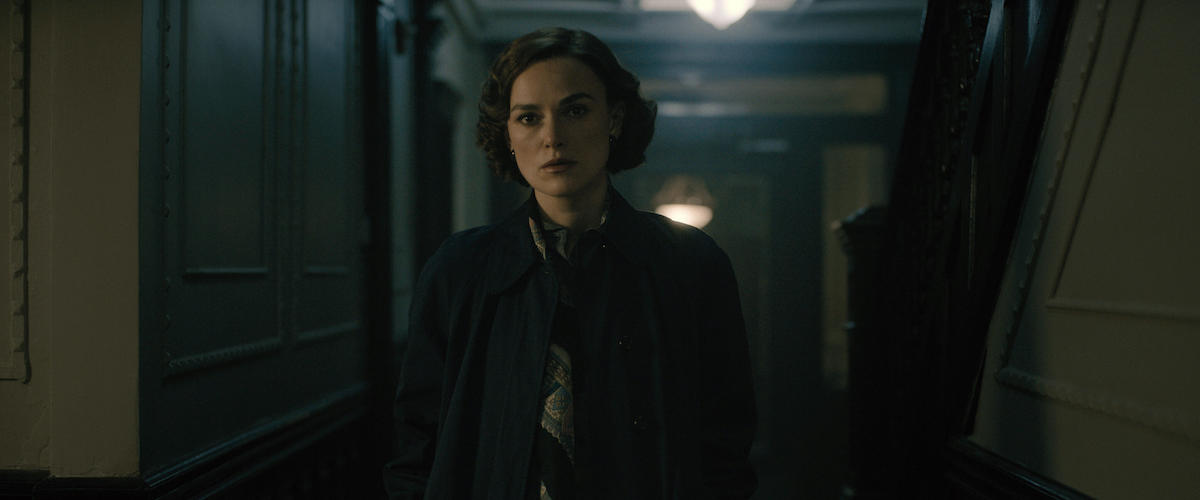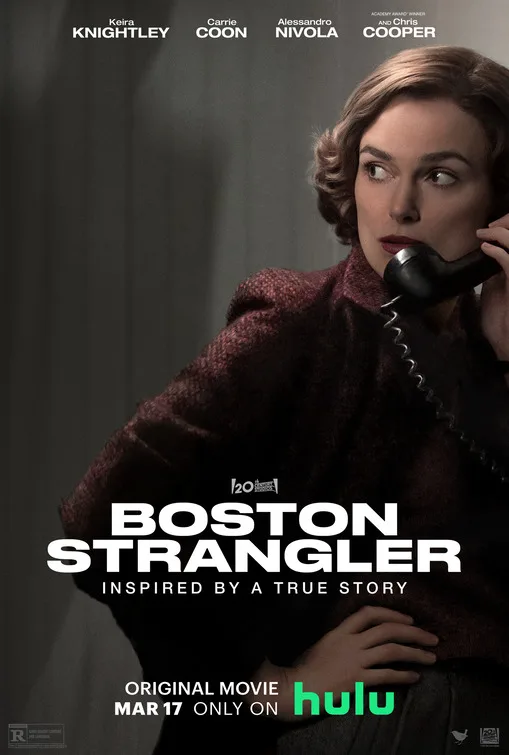Keira Knightley is a tenacious and compelling force in Matt Ruskin’s “Boston Strangler” as Loretta McLaughlin, a wife and mother originally working the Lifestyle section at the city’s Record-American newspaper. Alongside her collaborative partner Jean Cole (Carrie Coon), she discovers a connection behind recent gruesome murders in the area, in which women are strangled with their underwear tied around their necks in a bow. Loretta and Jean are the first to pursue and broadcast the connection through the paper. And they are well aware of this information’s importance for women all around the greater Boston area.
Writer/director Ruskin approaches this story as a type of newspaper noir, the kind that assumes David Fincher’s “Zodiac” as a main personality trait. But while this movie only carries over Fincher’s pale greens and sullen tone and less so that film’s general edginess, Ruskin’s flawed tribute to Loretta McLaughlin and Jean Cole can still entertain due to the feats of journalistic competency and courage it’s packed with.
“Boston Strangler” narrows itself over time, starting with how Jean is positioned on the sidelines like a supportive, been-through-it coach with a cigarette in hand (despite Coon’s rock-solid performance here, Jean’s arc must have numerous scenes on the cutting room floor). But the plotting takes on some interesting layers, including the point when Loretta and Jean call out the Boston police in the paper for how they have mishandled the investigation and left innocent Bostonians in a dangerous dark. Soon enough, Loretta has her first experience with creepy, masculine voices calling her house anonymously, to the irritation of her husband (Morgan Spector). And when she tucks in one of her kids to sleep, she sees a figure outside her window. Nevertheless, she persists in finding out the truth about the murderer.
As the murders continue, “Boston Strangler” evolves with some additional intriguing circumstances as a movie about women in a predominantly male space while investigating a crime about women in danger. But aside from one overheated scene with Loretta stepping into a possible danger den, the movie loses the worry of her facing immediate danger from either a murderer or anyone backing the police. Instead, the stakes are more about someone believing so hard in the case they risk losing focus on their family life, and yet “Boston Strangler” doesn’t have much space for that.
Instead, Ruskin’s script offers the comforting spectacle of gumption, of watching reporters push through dead ends. But even that loses out to the growing drabness of the movie, which is evident in a maudlin score heavy on somber strings and an absence of a distinct visual style that becomes increasingly glaring with each familiar sequence. There are many scenes of Loretta and Jean poring over documents, and moments meant to sting—like when Jean makes eye contact with a suspect in custody—lose their effect. Even the Boston Strangler cutaway scenes are too much like History Channel reenactments to offer an unsettling air.
The movie wants to be as streamlined as possible, and there’s plenty of reason to think more time with everyone would help fill out its themes. Luckily, Ruskin has the suave toughness of Alessandro Nivola, who plays a Boston cop who admits to being worn down by the case but starts to see the purpose in supporting Loretta’s tenacity. And there’s Chris Cooper as Loretta’s arms-crossing boss, a role so cliche-ready it could have been played by almost anyone. The same goes for the role of the Boston PD commissioner, played by Bill Camp—another revered character actor who can give gold in a brief amount of time, and yet not when surrounded by so much else that feels rote. And you can guess what kind of character David Dastmalchian plays, as resourceful as he can be.
Eventually, “Boston Strangler” reaches a point in which it is totally controlled by the wild course of events it is recreating, and it does make for decent, unsettling twists in a third act based on truth. But the emotional resonance is scant, even for how “Boston Strangler” casts another spotlight on game-changing Boston journalism. By the end, even Knightley only has so much space to construct a distinct arc from a dedication that lasted years and altered Loretta’s personal life. Ruskin succeeds in paying tribute to Loretta McLaughlin and Jean Cole’s hard work, but it’s less successful in filling in the larger story.
Now playing on Hulu.




















